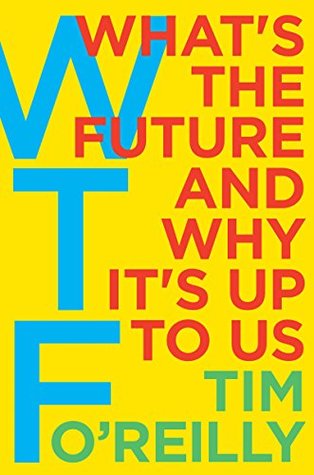More on this book
Community
Kindle Notes & Highlights
by
Tim O'Reilly
Read between
November 6 - November 13, 2017
science is not the collection of what we know. It is the practice of investigating what we don’t know. Ignorance, not knowledge, drives science.
One of the problems with many online learning platforms for teaching new technology is that structural literacy is all they provide. They are good for teaching beginners who know nothing about a topic—getting them to structural literacy about programming by teaching them JavaScript, for example, or providing a course on digital marketing—when what people need next is just-in-time learning about very specific topics.
In the end, on-demand education is not that dissimilar from on-demand transportation. You need a rich marketplace of people who know things, and others who need to know them. The way that knowledge is delivered—book, video, face-to-face teaching—gets a lot of attention, but the bigger question is how to bootstrap a rich knowledge network.
Part of the secret of Silicon Valley’s success, so difficult to replicate elsewhere, has been that there is a large pool of people who have the necessary skills to go to work at virtually any high-tech company and get productive fairly quickly. This concentrated labor force is not yet available everywhere.
the success of new technology depends on social capital,
the decisions in America over the past decades to ship manufacturing jobs overseas have effectively been a commitment to de-skilling without re-skilling.
At the speed with which technology changes today, we can expect the traditional education establishment to provide a foundation, but it will be the job of every company that wants to succeed to invest in the unique and ever-changing skills of its workforce.
The point of a disruptive technology is not the market or the competitors that it destroys. It is the new markets and the new possibilities that it creates.
Money is like gas in the car—you need to pay attention or you’ll end up on the side of the road—but a successful business or a well-lived life is not a tour of gas stations.
One test of a bubble is how many entrepreneurs are focused on their upcoming payday rather than on the big things they hope to accomplish. Me-too products are almost always payday-focused; the entrepreneurs who first made the market often had much less expectation of easy success, and were instead wrestling, like Jacob with the angel, with a hard problem that they weren’t even sure that they could solve, but that they believed they could at the very least make a dent in. Those who follow are too often just trying to cash in.
Our economy has many elements of a Ponzi scheme. We borrow from other countries to finance our consumption, and we borrow from our children by saddling them with debt, using up nonrenewable resources, and failing to confront great challenges in income inequality, climate change, and global health.
We should aim to build an economy in which the important things are a natural outcome of the way we do business, paid for in self-sustaining ways rather than as charities to be funded out of the goodness of our hearts.
the judgment of Kurt Vonnegut’s novel Mother Night: “We are what we pretend to be, so we must be careful about what we pretend to be.”
Pretending to be better than we are can be a way of setting the bar higher, not just for ourselves but for those around us.
Idealism doesn’t mean following unrealistic dreams. It means appealing to what Abraham Lincoln so famously called “the better angels of our nature.”
Scenario planning takes for granted that the future is uncertain. But it also notes that there are deep trends shaping the future that we can observe and take into account.
The goal is not to identify what will happen, but to stretch the mind to think about what might happen.
There are many trends that are big and inevitable, but growing more slowly than the entrepreneurial time horizon.
“Staying in Day 1 requires you to experiment patiently, accept failures, plant seeds, protect saplings, and double down when you see customer delight.”
The great political eruptions of 2016 also give me hope because they signal the beginning of the end of a failed economic theory. In the cracks in our society that they have exploited, and so unmasked, we can see that it is time to renew ourselves.


